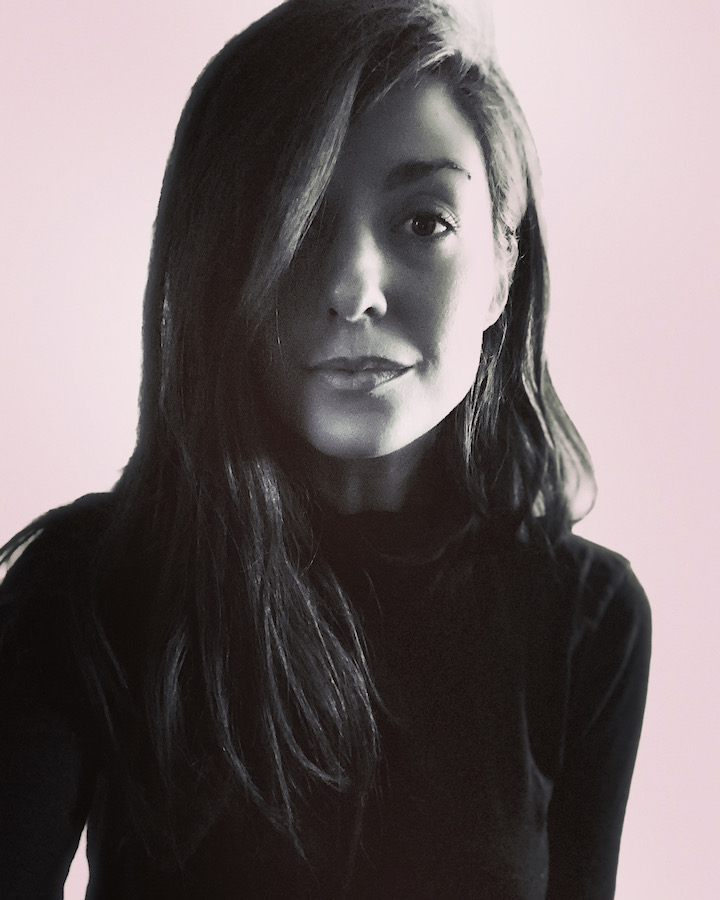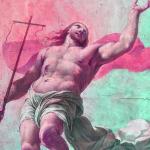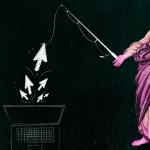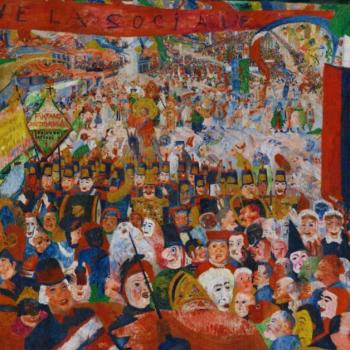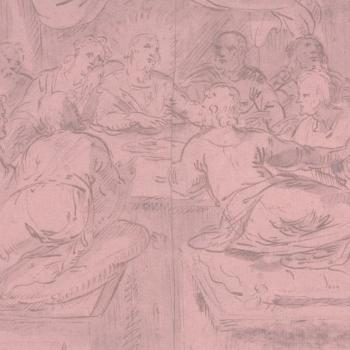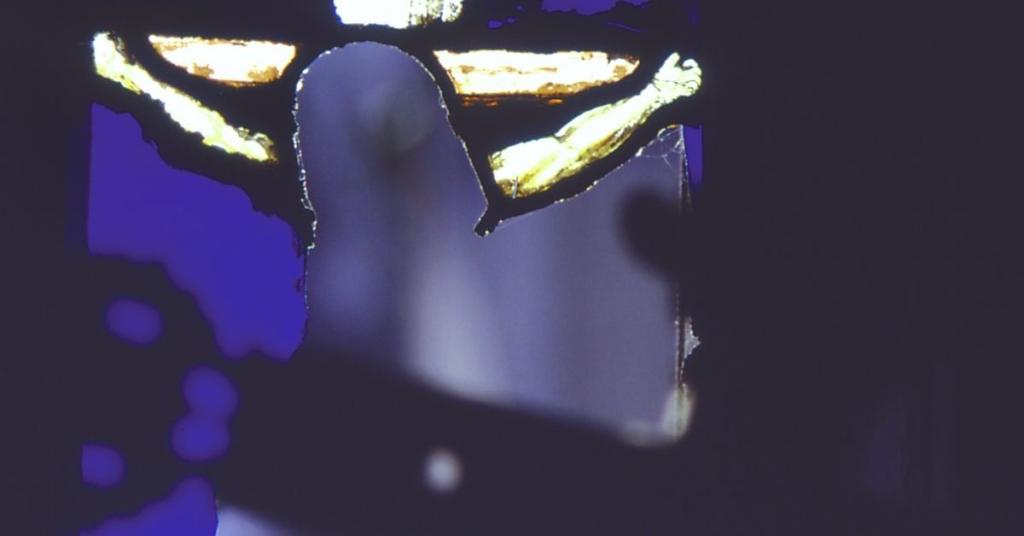
God finds god’s self in quite the precarious position these days, and everyone knows it. Christians are finding themselves full of nervous angst and heartbreak at what the future might hold regarding belief in God and those identifying as Christians. Atheists continue to argue the non-existence of God in the hopes of a future without one. Yet the Western understanding of Christianity is also what holds it together. For better or worse, our world stands on a particular knowledge of Christianity, and anything that opposes it is still reacting to it. As Jean-Luc Nancy points out, Secularism is simply a “transferal.”[1] It is an identical measure of certainty but in the other direction.
So, what is the hope of god in a post God world?
Christianity has been the master narrative the West has thrived (or survived) on for a very long time. Not only do we see Christianity crumbling, but the West as well. One can turn on the news to see any evidence of it. I may not know many things, but one thing I can tell you is that Secularism is not the answer to this conundrum. Why? Because it is the other side of the same coin.
So, with a future wide open, Christianity and Secularism failing alike, we have to follow the lead of John Drane when he asks, “What are the things that will be worth believing in the twenty-first century?”[2]
This is an excellent question, but one, perhaps, that needs a slight rewording. We know that Christianity cannot fix the problem(s) Christianity has created. Many conservative voices (enter Gospel Coalition, and no, I am not linking to it) say that we need more of Christianity to fix Christianity’s plight. But that is not how healing works. You don’t need more of the toxic thing to fix the toxic thing. You need its antithesis. If God is the problem, then maybe godlessness is the answer? No. This is just more belief at work.
The hope of god in a post God world is precisely faith.
In his book Cultural Change and Biblical Faith, Drane seeks to save Christianity by reevaluating what might be worth believing in for the twenty-first century. But perhaps belief is the problem.
In French philosopher and theologian François Laruelle’s latest book, Clandestine Theology, the forward opens with the question of faith vs belief. “Clandestine Theology sets out the conditions for a systematic distinction between faith and belief. It is clandestine because it does not go through any of the usual paths, which, at one point or another, mix these two orders.” The writer goes on to say, “One knows that belief is a complex and variable mixture…Faith is, by contrast, a kind of Ockham’s razor that remains partially indifferent to beliefs. It poses a certain resistance to beliefs, while at the same time offering the means to handle them. Faith is the function of the ‘without-religion.’[3]
Is faith what we are after? Over, against and past belief? And if so, what does this mean? How is it little more than semantics?
In Laruelle’s Christo-Fiction, he calls belief “worldly derailing.”[4] He says our faith is harassed by belief! Meaning it takes us away from the imminence and immanence of our embodied and embedded experience in the world and tempts us to feast our eyes on what he believes to be illusions of transcendence.
I do not mince words when I call myself a massive fan of John Mayer. My friends love to make fun of me. But as long as I can remember, I can basically quote the gospel according to John Mayer. On his second album, from his song “Belief,” he sings this lyric, “Belief is a beautiful armor that makes for the heaviest sword.” Indeed, it is.
Is it any wonder that god and god’s future is as precarious as it is? A dead god limping around without any return on its empty promises-THIS BELIEF!
I have talked of terms and notions like post Christian and now, indeed, post belief, but unlike the prediction of many, it has not ushered in the reign of the secular. In fact, Secularism was just a stopover in yet another religious paradigm, as Secularism is a reaction to belief.
So where are we moving now, and what is the hope?
Great Question!
Answer?
Post-Secular!
As Sanja Perovic writes, “Secularization is arguably the last master narrative that remains an article of faith in Western society.”[5]
This is it. It is smashing, collapsing, crumbling, and cracking! So, the hope of the post secular? It is post the God of belief and onto the god of faith. The god we imagine insists rather than exists (a la John Caputo).
The world has made it through the belief of the West, with its broken promises and betrayals.
We’ve lived through the dawn of Secularism, which was simply the other side of Christian belief, the belief of the West, with its broken promises and betrayals.
But there is a lingering-a desire of retrial-the suspicion of something more (or less!) than all of it. There is an awareness of the whispers, stripped of its containers, stripped of belief if you will.
This is the hope of god in a post God world.
Secularity has invited us all to be disillusioned with forms of belief that say ‘we know it is so.’ We’ve lived through eras and eras of belief and now, perhaps, we are finally able to ask what’s next, as the toppling of the last, great, master narrative can be heard in the distance. We look among the rubble and ruin of worldview based on certainty, and all we can do is wait for the dust to settle to pursue what theologian Richard Kearney calls “faith beyond faith…god after god.”[6]
To close on another word from Kearney, “Dawkins, Dennett, and Hitchens spend much of their time denouncing the diseases of believers without acknowledging the complexity of belief. They invoke the certainties of science against the falsities of faith, not appreciating that genuine faith has never expressed itself with certainty, but always through a cloud of unknowing.”[7]
The pursuit of faith through a cloud of unknowing.
This is what you can expect from my work and writing here.
Who knew Secularism would be god’s last hope? That god would be released into a post secular desire for all that we imagined faith might be.
[1] Jean-Luc Nancy, Dis-Enclosure: The Deconstruction of Christianity. (New York: Fordham University Press, 2008) 1.
[2] John Drane, Cultural Change and Biblical Faith. (Carlisle: Paternoster Press, 2000), 176.
[3] François Laurelle, Clandestine Theology: A Non-Philosopher’s Confession of Faith. (London: Bloomsbury Academic, 2020), forward.
[4] François Laruelle, Christo-Fiction: The Ruins of Athens and Jerusalem. (New York: Columbia University Press, 2015).
[5] Sanja Perovic, ed., Sacred and Secular Agency in Early Modern France: Fragments of Religions. (London: Bloomsbury Publishing, 2021), 1.
[6] Richard Kearney, Anatheism: Returning to God After God. (New York: Columbia University Press, 2010), 3.
[7] Ibid, 168.

